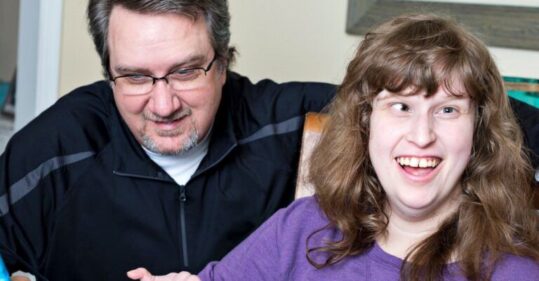More learning disability nurse leadership roles needed to ‘help drive’ improvements

The government must ensure more learning disability nurses go into senior leadership roles to ‘help drive’ improved health outcomes for people with a learning disability, a committee of MPs has urged.
In a new report published today, the Women and Equalities Committee (WEC) also highlighted that around 75% of people with a learning disability are not currently on the general practice learning disability register.
MPs on the cross-party committee warned that people with a learning disability and autistic people faced significant health inequalities, including an ‘unacceptable level of premature and avoidable deaths’.
Within its report – ‘Inequalities in healthcare and employment for people with a learning disability and autistic people’, WEC concluded that ‘overall care and outcomes too often still fall below acceptable standards’.
Learning disability nurses help ensure ‘access to good healthcare’
The committee raised concerns around the shortage of learning disability nurses in both primary and secondary care, recognising the profession’s role in ensuring ‘access to good healthcare’ for people with a learning disability.
Related Article: New digital support for community nurses in 10-year plan
Drawing on data from NHS Digital, it said that as of January 2024, there were 3,095 learning disability nurses working within NHS England hospital and community health services – down from 5,498 in January 2010.
And over the same period, the number of people with a learning disability has increased from an estimated 1,191,000 to approximately 1.3 million people, the report said.
While there was a commitment within the NHS Long Term Workforce Plan, published last year, to increase the number of learning disability nursing training places in England, the report urged the government to go further and support learning disability nursing leadership.
The committee said there were examples of ‘inconsistencies’ across primary and acute healthcare settings ‘in the level of seniority that learning disability nurses held’.
And it suggested that ‘a lack of knowledge around the role of learning disability nurses and clear routes into leadership roles and career pathways’ could also be contributing to low workforce numbers.
‘We welcome the commitment to train and recruit more learning disability nurses to help address some of the shortfall within the profession,’ said the WEC.
‘Alongside that commitment the government should support more learning disability nurses to go into senior leadership roles within hospital and community health services to help drive the necessary improvements to health outcomes for people with a learning disability.’
Many struggle to convince GPs to be added to register
The report goes on to highlight issues around the learning disability register – a list of all the people with a learning disability that a GP practice looks after.
Importantly, being on the list entitles individuals to receive reasonable adjustments, such as support with making decisions, and access to an annual health check.
However, according to the WEC around 75% of people with a learning disability are not registered.
Related Article: Nurse had to ‘freeze’ PPE during pandemic to re-use in care home, Covid inquiry hears
And it suggested ‘many struggle to convince their GP and practice staff to add them to the register’.
The WEC has now called on the Department of Health and Social Care (DHSC) and NHS England to work with national and local learning disability organisations and charities, and the Royal College of GPs to ‘investigate why eligible people are not on the learning disability register and take appropriate action to increase registration’.
It said this was an ‘immediate priority’ and that this work should include an assessment of the reasons why eligible people who have applied to be on the register have been denied access to it and a review of the existing guidance for GPs to ensure it captures all those who are eligible for registration, added the committee.
In addition, the government has been urged to launch an ‘awareness raising campaign’ to encourage people to ask their GP to be put on the learning disability register. The report said this campaign ‘should be appropriately tailored to deliver increased registration among underrepresented communities’.
Among other recommendations, the government was also urged to ‘re-establish a national board with a focus on improving health inequalities for people with a learning disability and autistic people across all health and social care services’.
WEC chair Caroline Nokes said: ‘It is deeply concerning to see that health inequalities continue to be significant among people with learning disabilities and autism, including an unacceptable level of premature and avoidable deaths compared to the general population.
‘The committee heard from people who struggled to convince their GP to put them on the learning disability register and only achieved success once the media and politicians were involved.
Related Article: Tell us what practice nursing means to you and potentially win £1,000
‘They should not have to reach that point, and not everyone will feel empowered to argue their case or have access to such advocacy to assist them. The system has to work better to ensure all people with a learning disability have access to good healthcare.’
Informing the committee as part of an evidence session last year, learning disability nurse consultant Jim Blair said that ensuring learning disabilities nurses worked across all settings was a ‘central factor’ in stopping unavoidable deaths and increasing life expectancy among people with a learning disability.
The DHSC was approached for comment.

See how our symptom tool can help you make better sense of patient presentations
Click here to search a symptom




